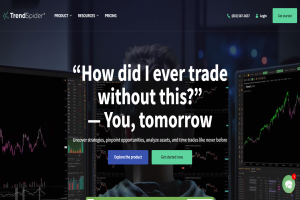Tool List
Top AI Tools for Trading
AI tools trading bots use algorithms to execute trades automatically based on predefined criteria, such as market trends, price movements, and risk tolerance. These bots can analyze market data, identify trading opportunities, and execute trades quickly and precisely, often beyond human capability. Costs for AI trading bots vary, with some offering free versions or pay-per-use pricing while others charge monthly subscriptions from $20 to $200 or more. AI trading bots are beneficial as they can operate 24/7, minimize emotional trading, and potentially increase trading efficiency and profitability, making them a valuable tool for novice and experienced traders in the financial markets.
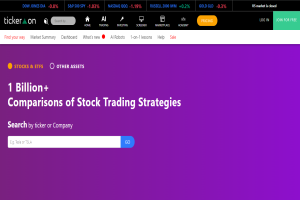
Tickeron
With TPE at your fingertips, you'll have access to the latest trends and insights, giving you a competitive edge in toda...
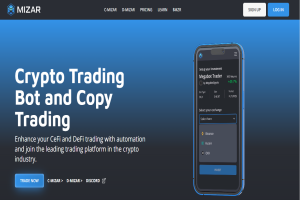
Mizar
Enhance your CeFi and DeFi trading with automation and join the leading trading platform in the crypto industry.

Tradesanta
Trade crypto like a pro without being one. Use our powerful trading bot and algorithmic strategies. Trade faster. M...

BitsGap
Best crypto trading bots, algorithmic orders, portfolio management and free Demo mode — all in one place.

Shrimpy
Shrimpy allows you to connect your exchanges and wallets to completely transform the way you invest in crypto. You can a...
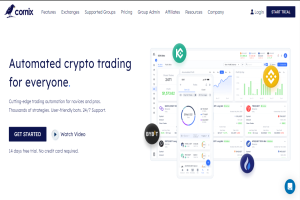
Cornix
Cutting-edge trading automation for novices and pros. Thousands of strategies. User-friendly bots. 24/7 Support.

3Commas
Build your portfolio while you sleep using expertly engineered automated bots that deliver the performance elite traders...
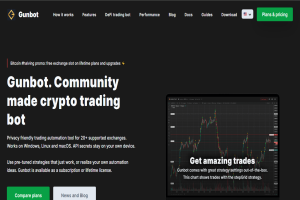
Gunbot
Privacy friendly trading automation tool for 20+ supported exchanges. Works on Windows, Linux and macOS. API secrets sta...
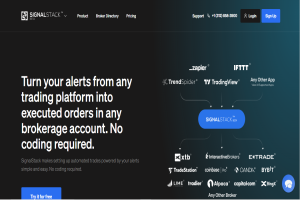
Signalstack
SignalStack makes setting up automated trades powered by your alerts simple and easy. No coding required.
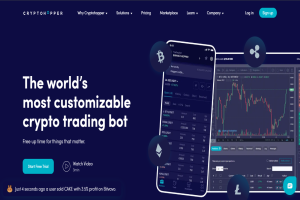
CryptoHopper
Keep up-to-date with the latest trading trends and expert insights on the world of cryptocurrencies, ICOs, and blockchai...
Frequently Asked Questions
AI tools for trading are software applications that use artificial intelligence to assist in making investment decisions, managing portfolios, predicting market trends, and executing trades automatically.
AI trading tools analyze large volumes of market data, using machine learning algorithms to identify patterns, trends, and potential trading opportunities. They can make decisions based on historical data and predictive analytics.
AI trading tools can potentially improve investment returns by executing trades at optimal times, reducing human error, and analyzing market data more efficiently than manual methods.
AI tools can trade a variety of financial instruments, including stocks, bonds, forex, commodities, and cryptocurrencies.
Yes, many AI trading tools are designed to be user-friendly, providing guidance and automated strategies that help beginners navigate the complexities of trading.
AI tools use algorithms to assess risk levels and adjust trading strategies accordingly. They can automatically set stop-loss orders and take-profit points to protect investments.
While AI tools can identify patterns and anomalies that may suggest a market downturn, predicting exact market crashes is extremely challenging due to the complex and unpredictable nature of financial markets.
The capital requirement depends on the specific tool and the markets it trades in. Some platforms allow users to start with minimal investment, while others may require larger amounts.
Algorithmic trading involves using AI algorithms to execute trades based on predefined criteria and strategies without human intervention, aiming for speed and efficiency.
Security varies by platform, but reputable AI trading tools implement strong encryption, data protection protocols, and compliance with financial regulations to secure user data and funds.
Advanced AI trading tools are capable of learning from new data and adapting their strategies in real-time to cope with changing market conditions.
Look for reliability, user reviews, compliance with regulatory standards, the quality of customer support, the sophistication of the AI technology used, and how well it fits your trading needs and risk tolerance.
Ethical concerns include the potential for market manipulation, privacy issues, and the need for transparency in how the AI makes trading decisions.
AI trading tools can increase market efficiency and liquidity but may also contribute to market volatility during times of stress due to high-frequency trading activities.
The future of AI in trading looks toward more sophisticated predictive models, integration of alternative data sources, and greater personalization in trading strategies, potentially making the trading landscape even more dynamic and interconnected.
Frequently Asked Questions
Q: What are AI tools for trading?
A: AI tools for trading are software applications that use artificial intelligence to assist in making investment decisions, managing portfolios, predicting market trends, and executing trades automatically.
Q: How do AI trading tools work?
A: AI trading tools analyze large volumes of market data, using machine learning algorithms to identify patterns, trends, and potential trading opportunities. They can make decisions based on historical data and predictive analytics.
Q: Can AI trading tools improve investment returns?
A: AI trading tools can potentially improve investment returns by executing trades at optimal times, reducing human error, and analyzing market data more efficiently than manual methods.
Q: What types of financial instruments can AI tools trade?
A: AI tools can trade a variety of financial instruments, including stocks, bonds, forex, commodities, and cryptocurrencies.
Q: Are AI trading tools suitable for beginners?
A: Yes, many AI trading tools are designed to be user-friendly, providing guidance and automated strategies that help beginners navigate the complexities of trading.
Q: How do AI tools handle risk management in trading?
A: AI tools use algorithms to assess risk levels and adjust trading strategies accordingly. They can automatically set stop-loss orders and take-profit points to protect investments.
Q: Can AI trading tools predict market crashes?
A: While AI tools can identify patterns and anomalies that may suggest a market downturn, predicting exact market crashes is extremely challenging due to the complex and unpredictable nature of financial markets.
Q: Do AI trading tools require a lot of capital to start?
A: The capital requirement depends on the specific tool and the markets it trades in. Some platforms allow users to start with minimal investment, while others may require larger amounts.
Q: What is algorithmic trading in the context of AI?
A: Algorithmic trading involves using AI algorithms to execute trades based on predefined criteria and strategies without human intervention, aiming for speed and efficiency.
Q: How secure are AI trading tools?
A: Security varies by platform, but reputable AI trading tools implement strong encryption, data protection protocols, and compliance with financial regulations to secure user data and funds.
Q: Can AI tools adapt to changing market conditions?
A: Advanced AI trading tools are capable of learning from new data and adapting their strategies in real-time to cope with changing market conditions.
Q: What should I look for when choosing an AI trading tool?
A: Look for reliability, user reviews, compliance with regulatory standards, the quality of customer support, the sophistication of the AI technology used, and how well it fits your trading needs and risk tolerance.
Q: Are there ethical concerns with using AI in trading?
A: Ethical concerns include the potential for market manipulation, privacy issues, and the need for transparency in how the AI makes trading decisions.
Q: How do AI trading tools impact the overall market?
A: AI trading tools can increase market efficiency and liquidity but may also contribute to market volatility during times of stress due to high-frequency trading activities.
Q: What is the future of AI in trading?
A: The future of AI in trading looks toward more sophisticated predictive models, integration of alternative data sources, and greater personalization in trading strategies, potentially making the trading landscape even more dynamic and interconnected.
Frequently Asked Questions
Q: What are AI tools for trading?
A: AI tools for trading are software applications that use artificial intelligence to assist in making investment decisions, managing portfolios, predicting market trends, and executing trades automatically.
Q: How do AI trading tools work?
A: AI trading tools analyze large volumes of market data, using machine learning algorithms to identify patterns, trends, and potential trading opportunities. They can make decisions based on historical data and predictive analytics.
Q: Can AI trading tools improve investment returns?
A: AI trading tools can potentially improve investment returns by executing trades at optimal times, reducing human error, and analyzing market data more efficiently than manual methods.
Q: What types of financial instruments can AI tools trade?
A: AI tools can trade a variety of financial instruments, including stocks, bonds, forex, commodities, and cryptocurrencies.
Q: Are AI trading tools suitable for beginners?
A: Yes, many AI trading tools are designed to be user-friendly, providing guidance and automated strategies that help beginners navigate the complexities of trading.
Q: How do AI tools handle risk management in trading?
A: AI tools use algorithms to assess risk levels and adjust trading strategies accordingly. They can automatically set stop-loss orders and take-profit points to protect investments.
Q: Can AI trading tools predict market crashes?
A: While AI tools can identify patterns and anomalies that may suggest a market downturn, predicting exact market crashes is extremely challenging due to the complex and unpredictable nature of financial markets.
Q: Do AI trading tools require a lot of capital to start?
A: The capital requirement depends on the specific tool and the markets it trades in. Some platforms allow users to start with minimal investment, while others may require larger amounts.
Q: What is algorithmic trading in the context of AI?
A: Algorithmic trading involves using AI algorithms to execute trades based on predefined criteria and strategies without human intervention, aiming for speed and efficiency.
Q: How secure are AI trading tools?
A: Security varies by platform, but reputable AI trading tools implement strong encryption, data protection protocols, and compliance with financial regulations to secure user data and funds.
Q: Can AI tools adapt to changing market conditions?
A: Advanced AI trading tools are capable of learning from new data and adapting their strategies in real-time to cope with changing market conditions.
Q: What should I look for when choosing an AI trading tool?
A: Look for reliability, user reviews, compliance with regulatory standards, the quality of customer support, the sophistication of the AI technology used, and how well it fits your trading needs and risk tolerance.
Q: Are there ethical concerns with using AI in trading?
A: Ethical concerns include the potential for market manipulation, privacy issues, and the need for transparency in how the AI makes trading decisions.
Q: How do AI trading tools impact the overall market?
A: AI trading tools can increase market efficiency and liquidity but may also contribute to market volatility during times of stress due to high-frequency trading activities.
Q: What is the future of AI in trading?
A: The future of AI in trading looks toward more sophisticated predictive models, integration of alternative data sources, and greater personalization in trading strategies, potentially making the trading landscape even more dynamic and interconnected.
